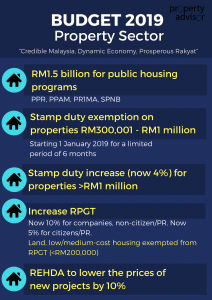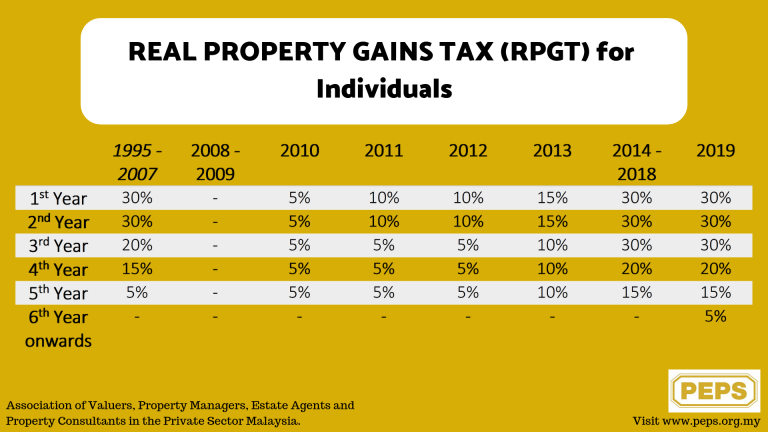Header Image from BNM
Real Property Gains Tax, or RPGT, is a form of tax imposed on the disposal of properties and the rate differs according to the number of years the owner has held on to the property. Stamp duty, on the other hand, is another tax payable upon purchase of a property.
Governments use RPGT and Stamp Duty primarily for revenue raising but it also acts as a mechanism to control inflation in the property market.

The announcement of tax hikes in the property sector during the tabling of Budget 2019 has caused a stir in the market, as many property players believe that it will further dampen the property market and discourages investments.
The hike involves an additional 5% in RPGT for disposal of properties owned from 6 years and beyond, as well as an increase of 1% in stamp duty for the instrument of transfer for properties exceeding RM1 million to RM2.5 million. The latter has been deferred for six months to July 1, 2019 whereas the RPGT hike has been in effect since January 1, 2019.
Association of Valuers, Property Managers, Estate Agents and Property Consultants in the Private Sector Malaysia (PEPS) president, Michael Kong told EdgeProp.my that the move will definitely dampen the property market, which is already softened and affect the investment appetite of those who view real estate as a long-term investment instrument.

He also added that the RPGT has now become a pure taxation instrument instead of a tax to curb speculation.
Kong also added that the 1% stamp duty hike for purchase of properties more than RM1 million should be implemented on house prices that worth at least RM1.5 million or RM2 million. The higher threshold would make more sense as houses worth RM1 million and above is aplenty in the market.
However, stamp duty is exempted for first-time home buyers for homes between RM300,000 to RM1 million for a limited 6-month period starting 1 January 2019 and 2-year exemption for the first RM300,000 for houses priced up to RM500,000.
Visit PEPS Malaysia Facebook page to get STAMP DUTY RATES, EXEMPTION CRITERIA & CALCULATION.
Who will be affected?
The hike is particularly detrimental to people whom have owned a family home for decades with large capital increases over the time.
Also, those who wish to upgrade their home as the family grows will also be affected.
This will also dampen investment into property and possibly hurting developers to a certain extent. The number of overhang properties keep on increasing year by year, hence a wider coverage of RPGT is expected to hurt the market even more.
Some relief has been announced such as the exemption of RPGT to individual Malaysian citizens who dispose their properties at a consideration price of RM200,000 and below. Whilst targeted at the B40, it leaves the rest of the market exposed.
From this standpoint, it is obvious that the government’s effort is locked towards helping first-time homebuyers and the lower income group. This depends on just how much this waiver can drive property sales within the respective price segment for us to see a recovering effect in the market.
Burdened with national debt and the strong urge to encourage home ownership among the lower income group, the government is taking objective measures to tackle these issues while helping to bridge the gap between the rich and the poor.
During the announcement of the stamp duty waiver, Finance Minister Lim Guan Eng said the exemption of the stamp duty is aimed at continuing to encourage first time house purchases by Malaysians, improving the purchase of unsold units from developers, as well as boosting the property market.
Malaysian Institute of Estate Agents (MIEA) president-elect Lim Boon Ping told EdgeProp that the revised RPGT will definitely discourage people to sell their properties but it could help to cool housing price growth which has exceeded most wage earner’s affordability.
Market outlook for 2019
Although this tax revision diminishes the appeal of property as an investment class, there’s a high possibility that this will result in a decrease of sub-sale supply – potentially driving up primary sales that may help tackle the country’s property overhang issue.
It was also announced that REHDA agrees to lower property prices by 10% in Budget 2019. Topped with rebates offered by developers, stamp duty exemption and crowdsourced funding, primary sales are expected to go up this year.
Follow PEPS Malaysia Facebook page to get more updates on RPGT and Stamp Duty.



